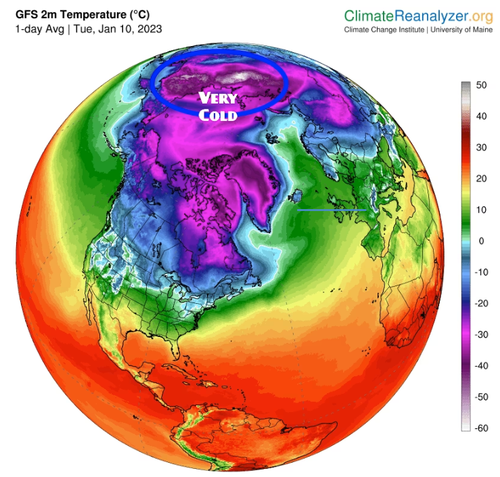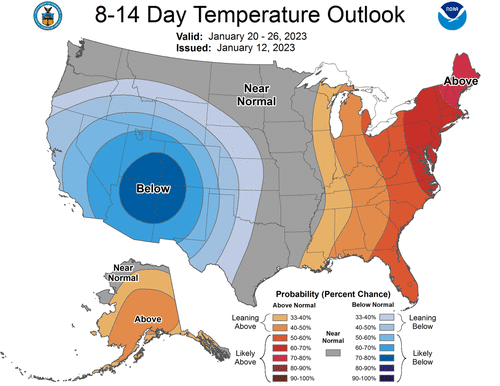We could get a second round of seriously cold conditions. Meanwhile the ice should be thickening and the passages may well slam shut this summer.
WE may well be now getting forty years of cold arctic conditions. No fun.
It will now be interesting to see now our northern grape crops hold up. Likely better than anticipated. We do have skills.
Siberia Records Minus-80 Degrees As Talk Of Polar Vortex Grows
SATURDAY, JAN 14, 2023 - 04:35 AM
https://www.zerohedge.com/weather/siberia-records-minus-80-degrees-talk-polar-vortex-grows
Several weeks after the Christmas Arctic blast, much of the US and Europe have enjoyed record warmth. Recall on Dec. 27, we noted the cold air mass from Siberia that spread across the continental US would dissipate into the new year. So far, this is correct, as three weeks of above-average weather has staved off an energy crisis in the Northern Hemisphere. But just north, in Siberia, temperatures are sinking to near-record lows. And it could only be a matter of time before the giant cold air mass swirling in the North Pole becomes unstable, breaks down, and begins pouring into the US and Europe.
Global warming alarmists who called for an imminent climate disaster last summer are scratching their heads as the rural northern Siberian town of Zhilinda just recorded temperatures of minus-79.8 degrees, according to climatologist Maximiliano Herrera, who tracks extreme temperatures across the globe.
Herrera told The Washington Post that Zhilinda was just a few degrees off from breaking its record low of minus-82.3 degrees. The all-time low for the Northern Hemisphere was set in Russia in 1933 at minus-89.9 degrees.
Earlier this week, Arcfield Weather's Paul Dorian said winter isn't over and called for a significant change in North American weather "in about ten days or so." Like anything, nothing is ever constant, and the warm spell could give way to colder temps later this month or early February.
"Sometimes, exceptionally cold air that builds over Siberia spills into the eastern United States," WaPo explained, adding:
"Although the eastern United States has had very mild weather since that late December cold blast, there is the potential for a significant pattern change toward the end of January."
For a polar vortex to flow into the US or Europe, there first needs warming in the Arctic stratosphere that pushes cold air lower. As explained by Michigan Weather Forecast:
This begins with the warming in the Arctic stratosphere which pushes the cold air south (simply put). The GFS, GEFS, ECMWS, and GEM models are displaying similar model runs. This is more of a heads-up than anything else. Do with it as you will, it is my humble opinion that winter in the sense of cold and snow isn't over yet. We will see if the CPC comes on board with this.
And on Twitter, many folks are posting models predicting winter isn't over and all that cold air trapped in the Arctic could pour into Europe and the US in the coming weeks.


No comments:
Post a Comment